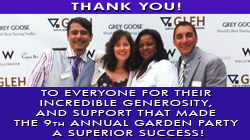As a lesbian, not only is this a place to live, but as an elder it is also wonderful to hear the wealth of the talent, and our contributions to our various communities.
About GLEH
McCormack Baron Salazar, Inc
McCormack Baron Salazar is the leading for-profit residential development and management company committed exclusively to rebuilding in urban neighborhoods. It is often called upon by cities to provide housing opportunities for neglected target populations. Its projects often evolve from extensive community planning exercises which produce a comprehensive plan to create new and attractive urban villages.
In the past twenty-eight years, the company has completed eighty-seven (124) projects with development costs in excess of $1.8 billion. It has developed nearly 14,000 housing units and one million square feet of commercial space. In addition, the firm manages nearly 15,000 units.
McCormack Baron Salazar developments are also characterized by a blend of financing sources -- both public and private. Its financing techniques incorporate a variety of funding approaches utilizing federal programs where available, tax-exempt financing, conventional loans, pension funds, foundation loans and grants, and equity from the private sector. During the course of its development activities in local communities, the firm has successfully created relationships with local government, the private sector, community-based organizations, and foundations.
The foundation community has seen value in many McCormack Baron Salazar projects. To date, such foundations including Ford, Pittsburgh, Heinz, Mellon, Hall Family (Hallmark), Cleveland, Gund, Danforth, as well as other corporate funds have invested approximately $50 million.
This rare socially-minded for-profit company has unique philosophy. McCormack Baron Salazar believes that the redevelopment process is best served by creating strong relationships with cities as well as with neighbors or neighborhood groups to learn their goals, needs, and expectations with respect to new housing within their community. Developments frequently involve partnerships with community groups, local government, and foundations. In nearly all instances, conventional development techniques are inappropriate for urban neighborhoods, and a joint venture with a non-profit organization or community development corporation creates a quality development that contributes to both neighborhood stability and city growth.





